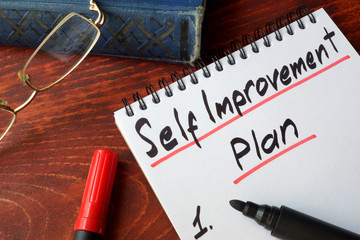Self-improvement is any activity that helps you grow as a person. It can be as big as learning a new language or as small as changing the way you treat yourself.
You have to understand what you can change and what you cannot. It’s like engineering: You have to figure out how to make small and stable changes. To learn more about Best Self Improvement Podcasts For Young Adults keep reading the article below.
When you set goals, it helps motivate you to improve yourself. Goals also allow you to measure your progress so that you can see the results of your efforts over time. To set goals, start by thinking about what you want to accomplish. Then, break each goal down into steps that you can take to reach it. The key is to make sure your goals are SMART – specific, measurable, attainable, relevant and time-bound.
For example, if your goal is to feel happier, you could plan to start each day with positive thoughts or affirmations. You might also try to savor positive experiences throughout the day or focus on letting go of negative emotions, such as anxiety.
You can also create a plan to help you stay focused on the tasks at hand and work toward your goals. This can be especially helpful for long-term goals that require incremental progress each day. For example, you might decide to work one percent closer to your goal each day instead of trying to achieve it all at once.
Another important aspect of setting goals is to determine whether you are fully committed to them. Self-improvement is not easy, and it can be hard to stick with it if you aren’t completely invested in the process. Be honest with yourself about your motivation and if you aren’t fully dedicated, consider changing your goals to ones that you can be more passionate about. Also, be careful about trying to change too many aspects of your identity at once.
Make a Plan
If you’re going to try to make a change in your life, it’s important to have a plan. It will help you stay focused and motivated. Set goals for yourself about where you want to be both personally and professionally in one month, six months, a year, etc. You can also write these down and refer to them often to keep yourself on track.
You can also break down your goals into specific tasks that you will do to achieve them. This is what is known as the SMART method of goal setting and achievement. It helps ensure that you have a concrete, measurable target to hit, like taking a certain number of professional courses in a given time frame. Having clear metrics for your improvement will allow you to see and celebrate your successes along the way, which can help fuel you to continue working toward your goal.
Some people approach self improvement with a sense of desperate realism and feel that there’s something inherently wrong with them the way they are. This type of person can become overwhelmed and paralyzed by the idea of trying to improve everything at once. They may start vacuuming up productivity advice and begin waking up at 5 AM and putting cow piss in their coffee, meditating for 30 minutes before breakfast, journaling with binaural beats in the background, visualizing their spirit animal, and eating an entire bag of raw almonds every day.
To be truly effective, a self improvement strategy needs to recognize that conscious willpower is limited and that any attempt at significant change must be built on the foundation of small, sustainable changes. Otherwise, you’ll end up like an engineer trying to siphon water from a mountain lake and attempting to get it to settle in a lower reservoir below.
Focus on Your Strengths
Focusing on your strengths is one of the most important aspects of self improvement. However, this does not mean ignoring your weaknesses. Instead, it means making sure that you have a basic level of competence in the things that you find difficult. For example, if you are not very good at writing, try taking some classes or learning from more experienced writers. You might be surprised at how much you improve.
In addition, focusing on your weaknesses can help motivate you to address them. If you have a weakness that is holding you back or keeping you from getting a job, for example, it will be very tempting to work on it. However, there is a danger in focusing too heavily on your weaknesses, as it can lead to overuse. For instance, if you are really good with a hammer, you might be tempted to use it for everything. It is very important to balance your strengths and weaknesses, and make sure that you are working on the right things at the right times.
It is also very important to celebrate your successes. Whether it is as small as a pat on the back for an accomplishment or as large as a spa day, it is essential to give yourself credit for the progress that you have made. This will not only encourage you to continue your efforts, but it will also give you a sense of pride and satisfaction in what you have accomplished.
Additionally, it is important to surround yourself with people who inspire you and support your efforts. This may be as simple as surrounding yourself with positive people or it could include seeking out a mentor or hiring a coach.
Take Care of Yourself
In order to reach your full potential, you need to take care of yourself. This means getting enough sleep, eating healthy, exercising regularly and focusing on your mental health. It also means taking time to do things you enjoy. It may seem difficult to find time for fun, but doing it will help you refuel and feel better about yourself.
The key to self improvement is becoming aware of your patterns and learning how to change them. A big part of this is learning about yourself, so make a list of your strengths and weaknesses. Then focus on developing your strengths and improving or managing your weaknesses.
Another important part of self-improvement is checking in with yourself on a regular basis. This will allow you to notice when your negative patterns are starting to emerge so that you can stop them before they spiral out of control. You can do this by journaling or using the technique described in Julia Cameron’s book “The Artist’s Way.” Each morning, write three pages about whatever comes to mind.
Self-improvement is about changing your total life strategy, which includes all of the behaviors, thoughts and beliefs you use to meet your needs and achieve your goals. These strategies can be conscious or unconscious and they may be aimed at achieving a specific outcome or simply coping with life’s challenges.
For example, you might want to become more productive or have healthier relationships. Changing your strategies will probably involve developing new habits, such as going to the gym or ordering a cranberry juice at Starbucks instead of a drama-filled cunnilingus from the McDonald’s drive-thru. You may need to try a few different approaches before you find one that works for you.
Give Yourself a Break
Often when people start a self improvement journey, they take it too far. They read too many productivity books, or they start waking up at 5am to put cow piss in their coffee, or they start journaling with binaural beats and visualizing their spirit animal. These things might help them improve in the short term, but they are also very stressful for the body and mind. Trying to do too much all at once can lead to burnout and actually make you less productive in the long run.
This is why it’s important to take self-improvement slowly and methodically. When you set a goal, be sure to break it down into specific, actionable tasks that can be scheduled and completed. Adding one small positive change to your life every week will add up over time and get you closer to your ultimate goal.
It’s also important to give yourself a break. If you spend too much time berating yourself for your mistakes, you’ll find it harder to move forward and become the person you want to be. Instead of beating yourself up over the past, try replacing regrets with dreams and giving yourself a pat on the back for what you have accomplished.

